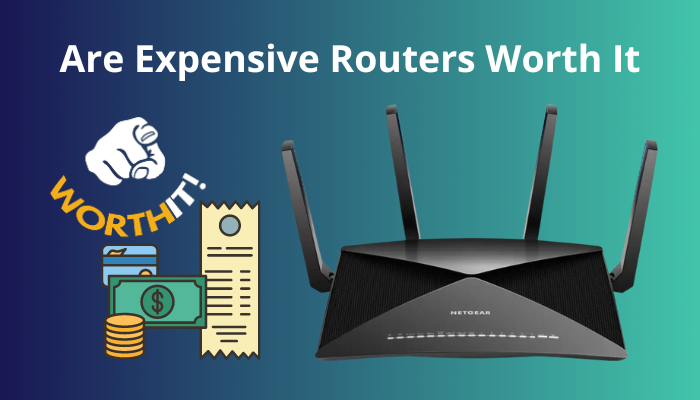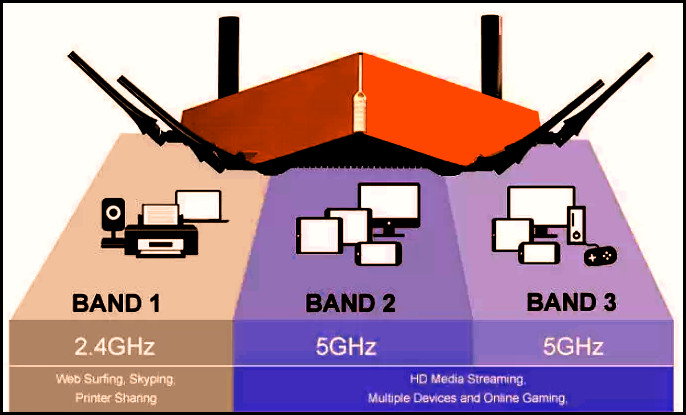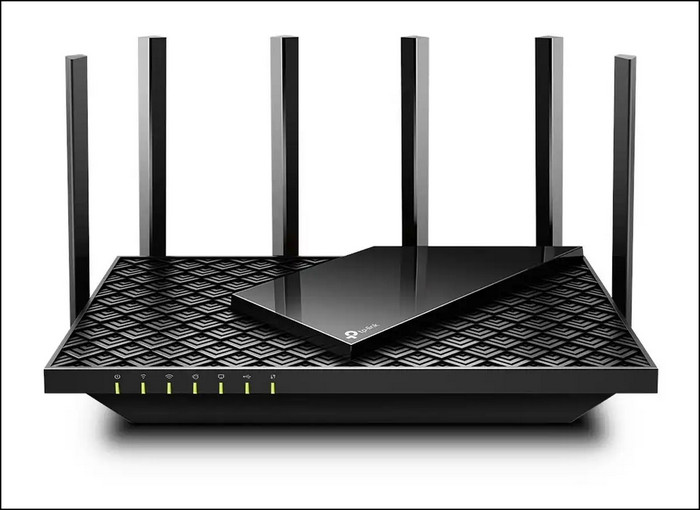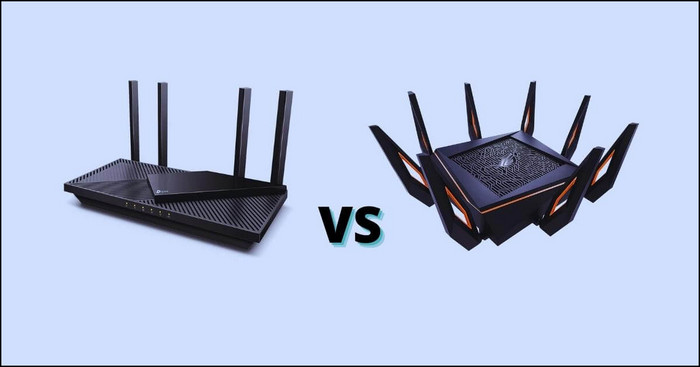Whether setting up a new home/office network or upgrading an existing one, fixing a budget to choose an ideal router can be confusing as routers come in various price ranges.
A quick online search will reveal that dozens of expensive routers claim to have the best in class performance & top-notch features. But do they deliver on these promises, and are they worth their hefty price tag?
Well, let’s unravel this mystery together now, shall we?
Also, check out our separate post on do routers have IP addresses.
Are Expensive Routers Worth It?
Yes. Expensive, high-end routers are worth it if you know how to take advantage of the special features of those routers to your benefit. But some regular home-network users may not notice the perks & advantages of the more expensive routers.
In general, expensive routers are indeed worth it due to their greater speed, coverage, security, reliability, better routing protocols, advanced WiFi standard & fast ethernet ports to enhance performance efficiency. Furthermore, expensive routers offer better build quality & longevity.
Additionally, a pricier router has greater capability to connect more devices without slowing down the speed or random connection dropouts.
However, in case of low internet needs, expensive routers may not offer anything noteworthy that isn’t already available on cheaper options. For those, an expensive router’s special features might not necessarily be worth forking out big bucks.
Here are the reasons why expensive routers might be worth it:
High Bandwidth
One of the most crucial reasons for choosing an expensive router over a cheaper one is it’s high-speed connectivity. More expensive routers tend to have much higher bandwidth than the lower-end models.
The expensive, high-end router models can go up to 1 gigabit per second, whereas the lower-end models can only go around 100-150Mbps. If your ISP can provide 1Gbps data transfer, buying the cheaper router won’t provide you with the full bandwidth of the network.
Furthermore, high bandwidth can also ensure that the internet won’t get throttled down when you have multiple users connected
This is very useful, especially for online multiplayer gamers using a public connection, as they don’t have to worry about getting reduced bandwidth when multiple users are connected to the router.
Security
Surfing the internet always comes with a potential risk of getting hacked, receiving malware/ransomware or other cybercriminal activities. Hence, getting yourself a router with the latest security protocol is mandatory.
Router manufacturers usually implement the latest security protocols in their more expensive tiers of routers. Higher-end router models can give you a secured private network & protect your personal/corporate data from leaking.
Check out our recent article on can a modem be used as a router.
Greater Coverage
Another major key advantage for higher-end routers is range. Expensive routers usually come with 3 or more antennas & better WiFi standards. Additionally, they also boast more powerful antennas compared to the cheaper models.
As a result, these higher-end routers can provide much greater coverage compared to the cheaper options.
Strong Connection
Considering your ISP has a stable service, a strong connection mostly relies on your router’s capabilities. Many cheap routers can often have trouble providing a steady connection throughout it’s network coverage.
As more expensive routers have much stronger antennas & better/latest WiFi standards(such as WiFi 6/6E), they can provide a more stable connection to all the users connected to the network simultaneously. Hence, users can avoid getting random connection dropouts.
Better Build Quality & Reliability
Router manufacturers generally try to give the best treatment to their premium customers. A higher-end, more expensive model will get made from more premium materials & have a much better build quality than the lower-end offerings.
These expensive routers also come with a replacement warranty to offer more confidence for purchase decisions. Rest assured, these routers are designed to last long & have a much less failure rate.
Furthermore, expensive routers are much more likely to receive firmware updates for a longer period of time compared to the cheaper models. They also have built-in protection for any power surge. As a result, they are much more reliable.
You may also like to read more on why Does a Router Affect Internet Speed.
Supports More Users
In corporate scenarios, it is really important to have a network service that can take the load of many users/devices. Cheaper routers, which are mainly oriented for home networks, can only handle around 4/5 connections/devices.
High-end routers have much better WiFi capabilities as they come with the latest networking standards & chipsets. As a result, expensive routers can handle much more data traffic across a large number of users/devices.
Smart Features
It might be gimmicky to some people, but expensive routers also offer a large variety of proprietary smart features, which you will rarely find in cheaper models. These features can often prove very much useful, especially for corporate usage or enthusiastic scenarios.
You can have parental control to protect your children from malicious websites easily. It also allows you to check their online activities & provides you with greater monitoring ability.
You can also control your internet bandwidth for different use cases. You can separately limit data for streaming & gaming. Hence, these features can improve your internet experience & satisfy your needs.
Do Expensive Routers Make a Difference?
An expensive router can make a world’s difference in a necessary scenario where you need a larger coverage and have to provide a steady, high-bandwidth connection for multiple users.
But an average home-network user may not notice any changes or perks as they won’t be able to utilize the special features that make those routers expensive.
Although, an expensive router won’t make any difference compared to the cheaper ones unless it has the necessary features. If the router is expensive only for its design, you won’t get any noticeable performance benefit or better user experience from it.
Hence, only the expensive routers that have the necessary/important features make a difference for the consumer.
Why an Expensive Router isn’t Always the Solution
You may think buying an expensive router will improve your connection. The truth is that acquiring a more powerful device will help you to have better results, such as greater speed, coverage or fewer cuts.
But sometimes, it may be unnecessary, and your experience will not improve if you buy an expensive router that can’t provide a noticeable difference due to a lack of necessary features or a lower-end internet connection from your ISP.
If you have a limited connection & low bandwidth net package, buying an expensive router won’t magically boost your internet speed or fix bad connection issues that occur on the ISP’s server side.
Furthermore, you won’t get an upgrade after buying an expensive router if you don’t have compatible devices to utilize the advanced network standards found in the more expensive routers, such as WiFi 6(802.11ax), WPA-3, MU-MIMO etc.
Additionally, if you already have enough coverage or don’t need to cover a huge network area, buying or upgrading to a more expensive router isn’t gonna make your experience any better. A less expensive router will suffice.
The same goes for the number of connected users. If you are going to use the network alone or with 2/3 other users, an inexpensive router will be more than enough to provide a stable connection to all. Buying a high-end router in such cases won’t be beneficial.
Cheap Vs. Expensive Routers
There are some critical differences between lower-end/cheap vs higher-end/expensive router models. It also depends on the manufacturing company as well. As we go from the cheaper tier of routers to the higher-end tier, our expectation also increases exponentially.
Taking a look at the differences between a cheap router & an expensive router can give us a definitive perspective on whether spending more money on expensive routers is worth it or not.
Here are the differences between cheap & expensive routers:
| Attributes | Cheap Routers | Expensive Routers |
|---|---|---|
| Performance | Cheaper routers tend to have less performance because the manufacturers use less powerful processors & RAM to cut down the cost. They also don’t focus much on software optimization for these lower-end routers. | High-end routers can offer industry-leading performance due to having more powerful processor & RAM. They also have much better software optimization compared to the cheaper options. |
| WiFi Standard | Cheaper routers generally have outdated WiFi standards, such as 802.11bgn. | Expensive routers offer the latest & greatest WiFi standards, such as WiFi 6(802.11ax) or WiFi 6E. |
| Range | Cheaper routers usually have much less coverage area as they use less powerful network chips, less advanced WiFi standards & less powerful antennas. | Expensive routers can cover a larger area & provide stronger connections than lower-end routers. |
| Band | Cheap routers generally have dual-band connection, one 5GHz & one 2.4GHz. | Triple-band routers cost much more than dual-band routers. Triple-band routers have two 5GHz & one 2.4GHz, which work in tandem to ensure strong network flow. |
| Antennas | Less expensive routers generally have 2-3 antennas which are enough for a home network with very limited users. | More expensive routers usually contain 3 or more antennas to provide greater user capacity. |
| Security | Manufacturers don’t usually include the latest or decent amount of security protocols in their less expensive routers. As a result, the cheaper ones tend to provide a less secure connection. | Expensive routers come with the latest & updated security protocols, which can provide a more secure connection. |
| Reliability | Cheap routers can be less reliable as they are constructed with cheaper materials & most likely won’t have much firmware support from the manufacturers. | High-end routers are much more reliable than cheaper options because they have better build quality & are much more likely to get firmware updates. |
These are some of the key differences between cheaper routers & the more expensive, higher-end routers. These should give you a conclusive idea about whether you should settle for the cheaper routers or dish out some bucks for the higher-end models.
Things to Consider Before Buying
When you are shopping for a router, you need to make a choice based on your needs & how much budget you have. If you are only gonna use the network for home, have around 2/3 devices/users and are tight on budget, then any standard router will be enough for you.
Make sure the new router is compatible with your ISP. Also, check which WiFi standards are supported on your devices. If your devices support 802.11ac WiFi, you can any WiFi 5 or below routers. But consider buying the router with WiFi 5 standard to properly utilize the network.
Additionally, if you want to use a high-bandwidth network package, you need to buy routers accordingly. A lower-end router won’t be able to provide high-speed internet to utilize the network package. Consider going for the routers which have 100mbps+ bandwidth capacity.
In case you need to provide the network to many users, consider going for the router with a tri-band network instead of a dual-band.
Tri-band routers are much more expensive but can offer greater connection capacity & ensure better data transition. WiFi range will also improve compared to dual-band routers.
Here are the things you need to consider before buying a router:
- Budget.
- Network purpose(home or corporate).
- Bandwidth.
- Range.
- Number of users.
- Features.
- Reliability.
- Security.
Additionally, some users might also want to buy a router that matches their room/setup aesthetic. You can buy custom skins online & apply them on the router to change it’s appearance in case you don’t want to spend more money on overpriced aesthetic routers.
Frequently Asked Questions
Does a better router really make a difference?
Yes. A better router can be the difference between a nearly flawless network and one that constantly gives you trouble.
Why does my router have 2 antennas?
Many modern routers these days offer 2 or more antennas to avoid Wi-Fi fading, dead spots, and drop-outs. It also offers larger coverage.
What is WiFi 6E?
Wi-Fi 6E is a WiFi network standard with a new 6GHz band which expanded on the existing Wi-Fi 6 (802.11ax) standard. It provides a more contiguous spectrum and less interference.
Wrapping Up
In the end, it depends on the users’ requirements whether expensive routers are worth it. If you need a strong,high-bandwidth connection & want to utilize the unique features that high-end routers have to offer, then by all means, go for it. Otherwise, a regular router will suffice.
That’s about it. Hopefully, this write-up has provided you with the necessary answer & explanation that you were looking for. If you have any further queries, feel free to share your thoughts in the comment section below.
Adios!